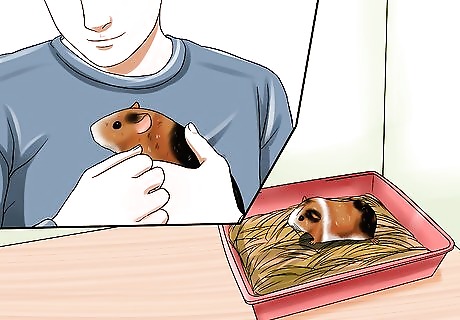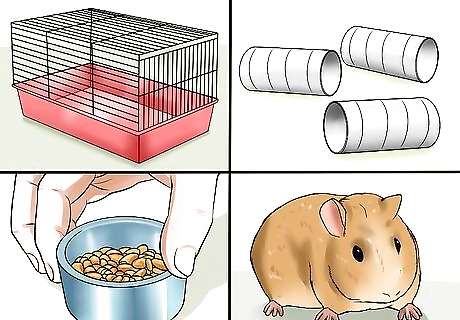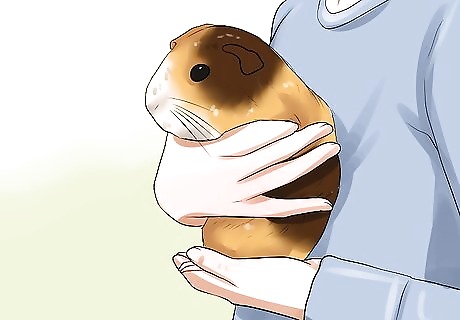
views
Showing your Commitment

Learn everything you can about guinea pigs. Research all the pertinent information that goes into taking care of them. You should be equipped with an arsenal of knowledge so you can respond to any questions your parents ask you about guinea pigs. A few facts about guinea pigs to get you started are: Guinea pigs live about seven to eight years and are very social creatures. A cage for a guinea pig should be at least two feet wide by four feet long for each guinea pig. Guinea pigs need a diet rich in Vitamin C. They can only store Vitamin C for a short period of time because they lack the enzyme necessary to break it down.

Keep a journal. Write down all the information you learn about guinea pigs in a multi-subject notebook. You'll use your notebook for reference when you're answering your parents' questions. Make sure your information is organized. This will show your parents that you are responsible and that you really care about this.

Let your parents know that you like guinea pigs. Give your parents hints that you're interested in guinea pigs. Find ways to show your parents some of your research. Tell them interesting facts about guinea pigs. They'll be impressed. Say things like: “Did you know guinea pigs come from South America and were domesticated by the Incas over three thousand years ago?” “Did you know guinea pigs weigh between one and a half and two and a half pounds and can grow up to ten inches long?” "Did you know that guinea pigs are actually very social and affectionate? They're mostly active in morning and evening."

Volunteer at a local shelter. Find a shelter in your town that takes care of guinea pigs and ask your parents if they'll take you to volunteer there. You'll gain hands on experience taking care of, cleaning up after and taming guinea pigs. The shelter will also be a great place to meet people who may be able to take care of your guinea pigs when you need them to down the line. Some larger pet stores work with animal shelters, so you can volunteer directly in the store. You may still have train at the actual shelter for a few days, however.
Making your Pitch

Tell your parents how owning a guinea pig will benefit you. Guinea pigs are great starter pets that aren't nearly as expensive as other household pets like cats or dogs. They're also quiet and easy to feed. They don't require too much attention either. Educate your parents by saying things like: ”Taking care of guinea pigs will teach me responsibility.” “Guinea pigs are herbivores so all they require is fresh vegetables and pellets. They don't like the expensive animal-based treats that dogs and cats do.” “Veterinary bills for guinea pigs are usually much smaller than those of larger animals.” “Guinea pigs can entertain themselves for long periods of time with cheap, homemade toys like toilet paper rolls stuffed with hay. I'll still have time to take care of my other responsibilities.”

Explain that you'll need at least two guinea pigs. Guinea pigs live in groups of eight to ten in the wild. Say “Guinea pigs are social creatures. We'll have to get two, but they'll need less attention because they'll keep each other company.” Make sure your guinea pigs are suitable to cohabitate. Two female guinea pigs will usually get along quite well. Two male guinea pigs will violently fight each other unless they are both neutered. A male and a female guinea pig will breed excessively unless the male is neutered.

Make an inventory. Let your parents know everything you'll need to take care of your guinea pigs. Figure out the cost of all the items you'll need to store your guinea pigs, to feed them and to keep them happy. For example, your list might include: Cubed grids, coroplast and fleece bedding to make the cage. PVC pipes to make a hide for each guinea pig. Pellets, hay and fresh produce to feed your guinea pigs. Guinea pig toys or materials to make toys with. The cost of 2 guinea pigs, including veterinary care and neutering for male guinea pigs.

Offer to pay for what you can. Show your parents that you're serious about owning guinea pigs by putting your own money towards the cause. Find out how much of your own money you can spend on your guinea pigs. If you don't have a lot of money, mention that you'll look for a job. Depending on your age, this might be doing chores, babysitting, or working retail.

Negotiate for the rest. If you don't have enough cash to cover your guinea pigs, offer to pay your parents back in chores around the house. Show them you're willing to work hard to earn your guinea pigs. Say something like “I may not have enough money to pay for the guinea pigs on my own, but I'm willing to do any jobs you need me to in order to pay you back.” Mow the lawn. Wash the car. Paint the house.

Listen to your parents. Ask your parents what concerns they have about your proposal and listen to what they have to say. Take some time before asking this to contemplate what your parents' concerns might be so you can come up with ways to respond to them. Some things they might be worried about are: The time commitment of owning guinea pigs might cut into your other responsibilities. Keeping guinea pigs may smell bad. Who's going to take care of your pets if you have to leave town?
Showing your Parents You're Responsible

Stay on top of everything. Show your parents that you can handle all of your responsibilities. They're not going to let you have guinea pigs if you can't take care of the duties you already have. Get good grades. Do all your homework when you get it. Help out around the house. Stay out of trouble.

Be respectful. Stay calm. Don't try to force your parents to give you an answer right away. Try to see things from their point of view. If you try to push them too hard, their answer will almost definitely be no. If they say no to having guinea pigs, don't take it personally. They may have a very good reason or it may not be the right time. For example, you could say “I respect your decision, but I'm dedicated to showing you that I can handle owning guinea pigs. I hope I can change your mind in the future.” If you handle your parents denial maturely, there's a better chance that they'll say yes later on.

Be resilient. Even if your parents say no, continue to show them that you're responsible. They may just need to see you consistently handling all of your business for a little longer. Remember that your parents want you to succeed and may be trying to teach you a lesson about earning the things you want. Your parents might be worried that you were only acting responsible to please them, and that you'd stop when they say "No" or "Yes." By continuing to act responsible, regardless of their reply, they'll see that you are actually ready to own a guinea pig, and might reconsider their answer.

Keep working with guinea pigs. Continue volunteering at the shelter and gaining experience with guinea pigs. Remind your parents periodically that you still would love to have your own guinea pigs. Say things like “Today, I learned how to build a homemade guinea pig cage. It was so exciting.” Don't bring up the issue too often. You don't want to appear pushy. Be patient.




















Comments
0 comment